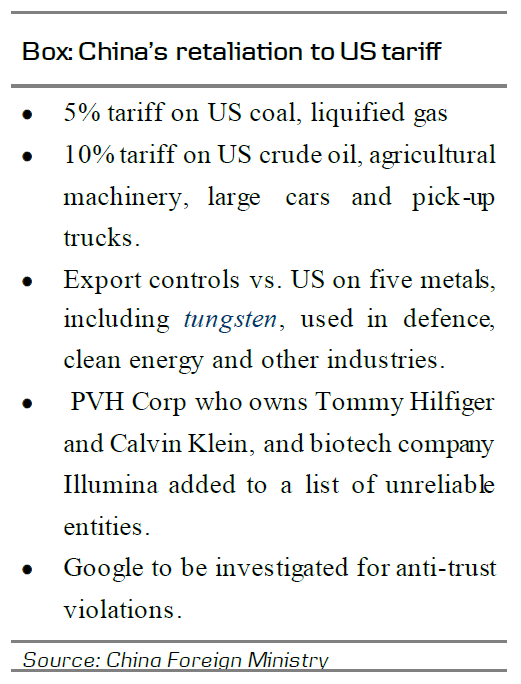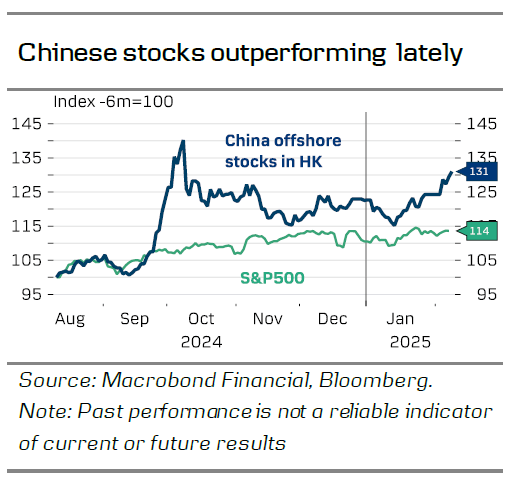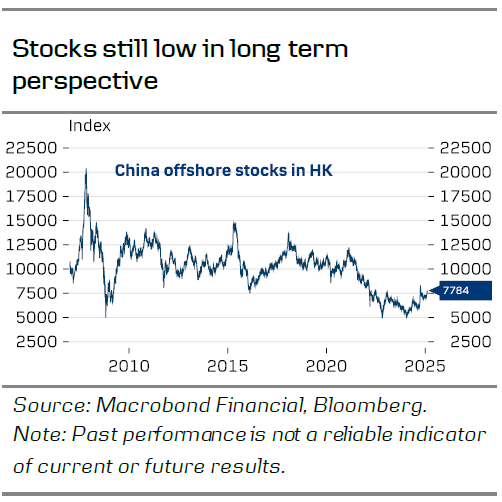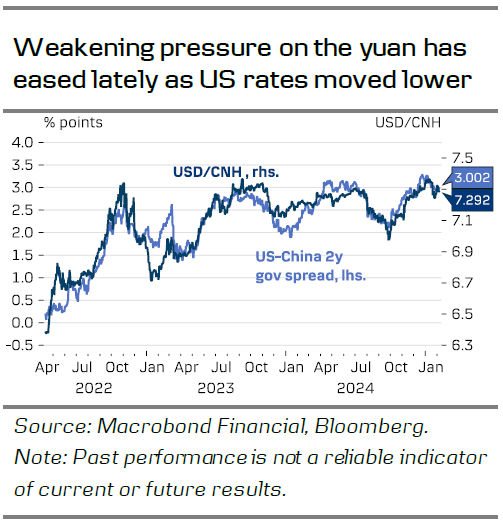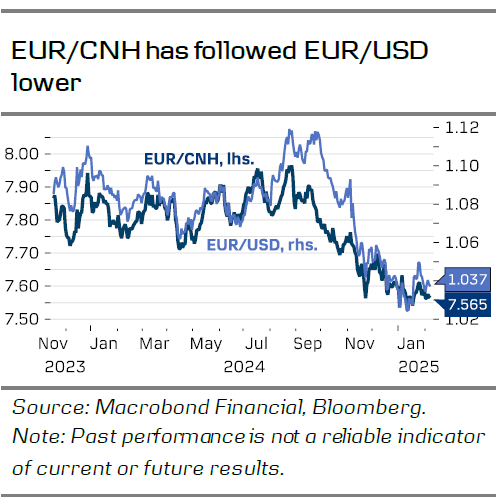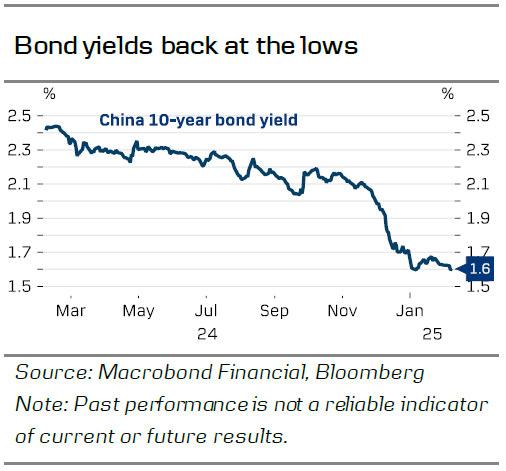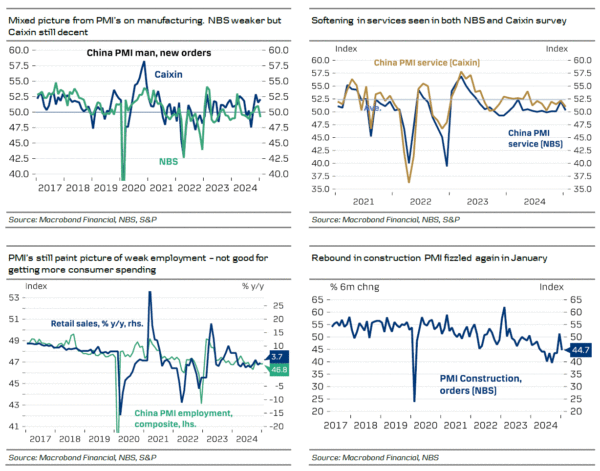Geopolitics:
First shots have been fired in trade war: While it took more than a year before the trade war starting in the first term of US President Donald Trump’s, it only took 10 days this time. A 10% tariff rate was put on China related to Fentanyl coming to the US via Mexico. China was quick to retaliate with tariffs on energy, export controls on metals and targeting several US companies (see box).
It is interesting that China throws export controls into the mix in its retaliation as it has normally only been used in the ‘tech war’ in response to US export controls on microchips. Several commentators have interpreted China’s retaliation as moderate as the tariffs only cover a small part of imports coming from the US. However, I would argue the export controls on key metals are more painful for the US and the same goes for measures towards single US companies. PVH Corp dropped 15% since the retaliation was announced. China sends a clear signal it could hurt other major US companies and thus US stock market performance in case of a further escalation. PVH Corp may not move the overall market but if China goes after big US tech companies, and potentially Tesla, it could have a wider impact. Nvidia is already under an anti-trust investigation and China looks into a similar move on Intel. China likely knows that Trump may be more sensitive to how US stocks perform than tariffs on US trade.
Xi-Trump call cancelled, tariffs just an ‘opening salvo’: A call between Xi and Trump was apparently planned to take place on Tuesday this week but cancelled after China retaliated. On Tuesday afternoon, Trump said he was in no hurry to speak to Xi and that the tariffs was only an ‘opening salvo’. He added that “If we can’t make a deal with China, then the tariffs would be very, very substantial“. As I wrote last week the ‘real’ trade war will probably not start until the US trade study looking into China’s unfair practices etc. is done by 1 April. Our baseline scenario is still that US average tariffs on China will ultimately end up of around 40% over the next 1-2 years from currently just below 25% (including the latest 10% increase).
Panama leaves Belt and Road Initiative, US claims victory: Panama is officially leaving the Chinese Belt and Road Initiative following US pressure. The news came few days after US Secretary of State Marc Rubio visited the country and Rubio called the decision a “victory”. China’s ambassador to UN Fu Cong called the decision “regrettable” and said that “The smear campaign that is launched by the US and some of the other Western countries on the Belt and Road Initiative is totally groundless”. An audit by Panama of the Hong Kong company that operates two of the five ports in the Panama Canal has been launched and a law suit has also been filed against the Hong Kong company. It seems likely the company will end up having to end the port operations.
Panel warns US risk losing next industrial revolution: At a hearing held by the US-China Economic and Security Review Commission, a panel of China experts warned that the US is at risk of falling behind China as the country is making significant strides in the realms of artificial intelligence (AI) and humanoid robotics. One panellist stated, “China’s AI and robotics ecosystem has seen significant growth, with major companies driving innovation in humanoid robotics and embodied intelligence…these firms are pioneering advancements in robotic hardware, AI integration, and industrial automation, positioning China as a leader in next-generation intelligent robotics.” China’s decades long focus on tech and industrial policy programs continue to put China at the frontier in a rising number of manufacturing areas, such as within EVs, batteries and drones. AI and robotics are also advancing fast.
Markets:
Chinese stocks on a roll: Despite Trump firing the first tariff shots last week, Chinese stocks have performed strongly. This week offshore stocks were up 6% and they have outperformed US stocks lately. The DeepSeek breakthrough two weeks ago has provided optimism back to tech stocks that have led the gains. With more stimulus, positive tech stories and Chinese long-term funds pushed to invest in the market, equities are getting a better foundation. The upside may be capped once the trade war really takes off. In the medium to long term, I still see value, though, as current levels are still low in a historical perspective.
CNY weakening pressure eased lately: Despite the rise in US tariffs, the pressure on the yuan has eased somewhat over the past weeks (chart). It reflects a slight weakening of the overall USD as US yields have moved lower and the removal of tariffs on Canada and Mexico for now. We continue to see USD/CNY moving higher on a 12-month horizon towards 7.60 as we look for the trade war to get tougher during the year. EUR/CNH has stabilized somewhat around the 7.56 level mirroring the stabilisation seen in EUR/USD (chart).
Chinese bond yield back at lows: The Chinese 10-year yield is back at the recent low of 1.60% as the soft PMI data and threat of tariffs has added to the expectations of low(er) for long. Next week CPI data are likely to show another weak print for January.
Economy:
PMI’s for January warning of need for continued stimulus: Chinese PMI’s from both NBS and Caixin pointed to some weakening in January, especially in the service sector (see charts below). The first months of the year should always be treated with some caution due to the effects from Chinese New Year, but still the numbers give rise to some caution and underlines the need for continued stimulus.
Strong China New Year travel spending: Providing some light was reports of strong holiday spending over the New Year break last week. The number of trips hit 501 million, a 5.9% increase from last year. The number of foreign travellers also reached a level similar to the one prior to the pandemic suggesting that China’s visa-free travel has had a clear positive effect on inbound tourism.

